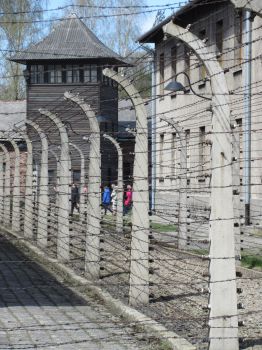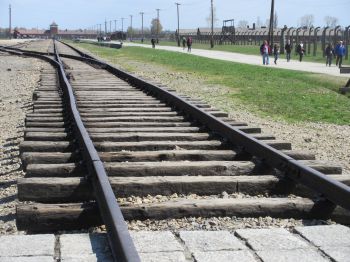Auschwitz visit inspires students' president to improve hate crime reporting on campus
By: Jacqui Bealing
Last updated: Monday, 26 November 2018

Auschwitz-Birkenau death camp

Auschwitz-Birkenau death camp
“I cried. Many of us did. Even though you know you are going to be affected, you cannot anticipate the actual feeling of it.”
This was the response of Frida Gustafsson, President of the University of Sussex Students’ Union (USSU), after visiting the notorious Nazi death camp of Auschwitz-Birkenau as part of a government-funded trip for university sabbatical officers and university leaders.
Frida, USSU’s Education Officer Ella Asheri, and the University’s Pro-Vice-Chancellor for Education and Students Kelly Coate, were among the representatives from more than 40 English universities who made the one-day trip to Poland on 18 November organised by the Holocaust Educational Trust (HET) in partnership with the UK’s Union of Jewish Students.
The trust largely organises trips for schools. This was the first for universities, made possible with a grant from the Ministry of Housing, Communities and Local Government and the Department for Education, with the intention of countering an increase in antisemitism on campuses.
Frida accepted the invitation because “with antisemitism being on the rise across campuses, across politics, across society, I wanted to understand more about the roots of it and what happens when you don’t stand up and say anything.”
She joined 92 other sabbatical officers and 29 university staff members for a tour of the camp where more than one million people, mostly Jews, died during the Second World War.
“It was noticeably a place where something terrible had happened,” she said. “There was such an obvious absence of presence. It reminded you of all the gaps where people would have been now. All the families, all the children, the fathers, the mothers. If they hadn’t been murdered, what would we look like now?”
It was also a reminder that the Holocaust and its aftermath were still “a living, breathing memory for many” she said. “There were survivors on the trip, and many people said their grandparents had died in the camps.
“What really struck me was that the events and conversation that happened before the Holocaust also aren’t in the past. They continue. The survivors talk about how it started with people shouting at you, or calling you names. And the Jewish students on the trip said they had similar experiences in 2018.”
Since her return, Frida has been in touch with the SU’s Jewish Society (JSOC) and Jewish students to look at how Jewish students can be better supported at Sussex.
“I’m particularly keen to look at hate crime reporting,” she said. “When faced with antisemitism, Jewish students often feel like there’s no point in reporting it. But I want to start that conversation about what we can do.”
Kelly Coate said: “I’d been to Auschwitz in the early 1990s and knew it was an experience that you can’t walk away from and forget. Although I wasn’t particularly looking forward to going back, I wanted to support the Holocaust Education Trust’s initiative of enabling university students to learn about the Holocaust.
“We heard many testimonies, including from one of the few remaining Holocaust survivors, of families being separated during the Holocaust. These acts of utter inhumanity are occurring in society today, and we have to remember where this might lead us.
“It was really harrowing walking around Birkenau as it got colder and darker, but at least we could walk out through the gates at the end of the day. All I wanted to do was ring my family back home.”
